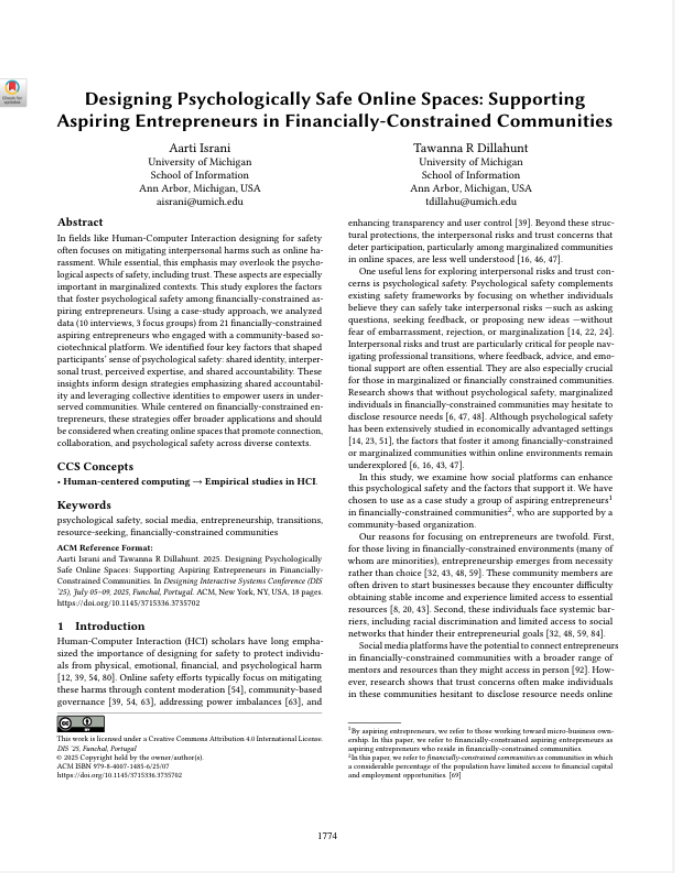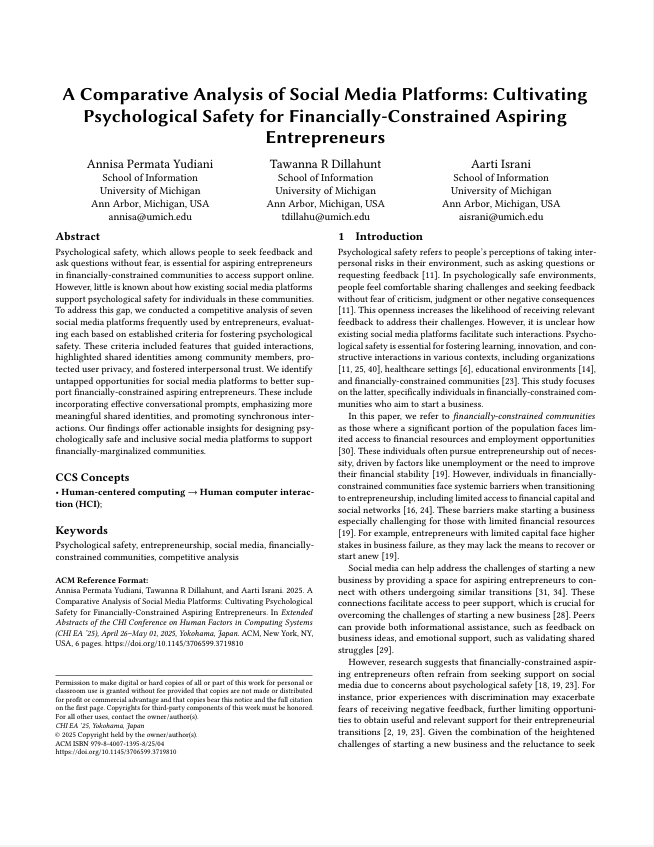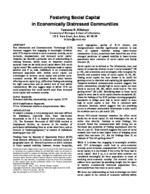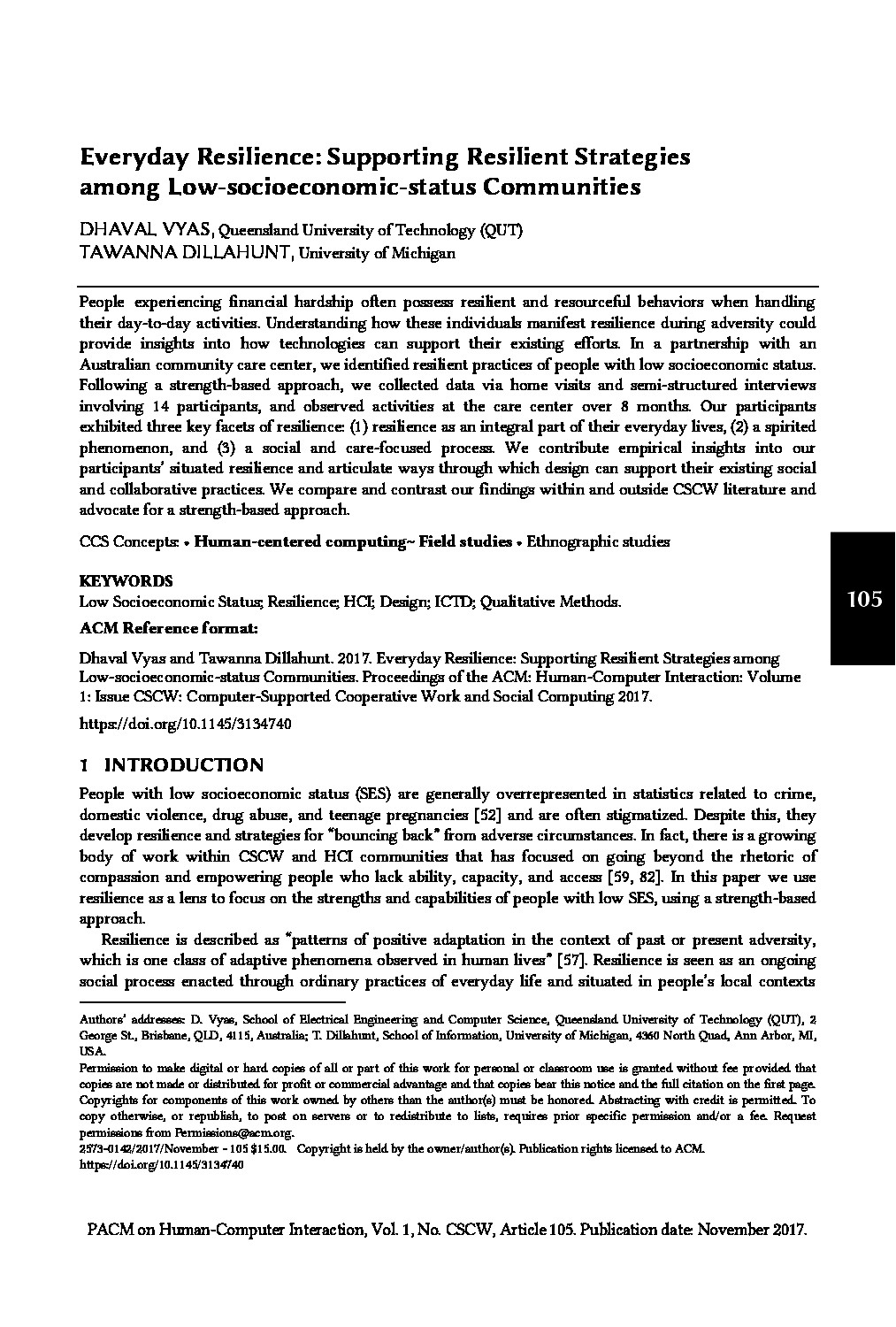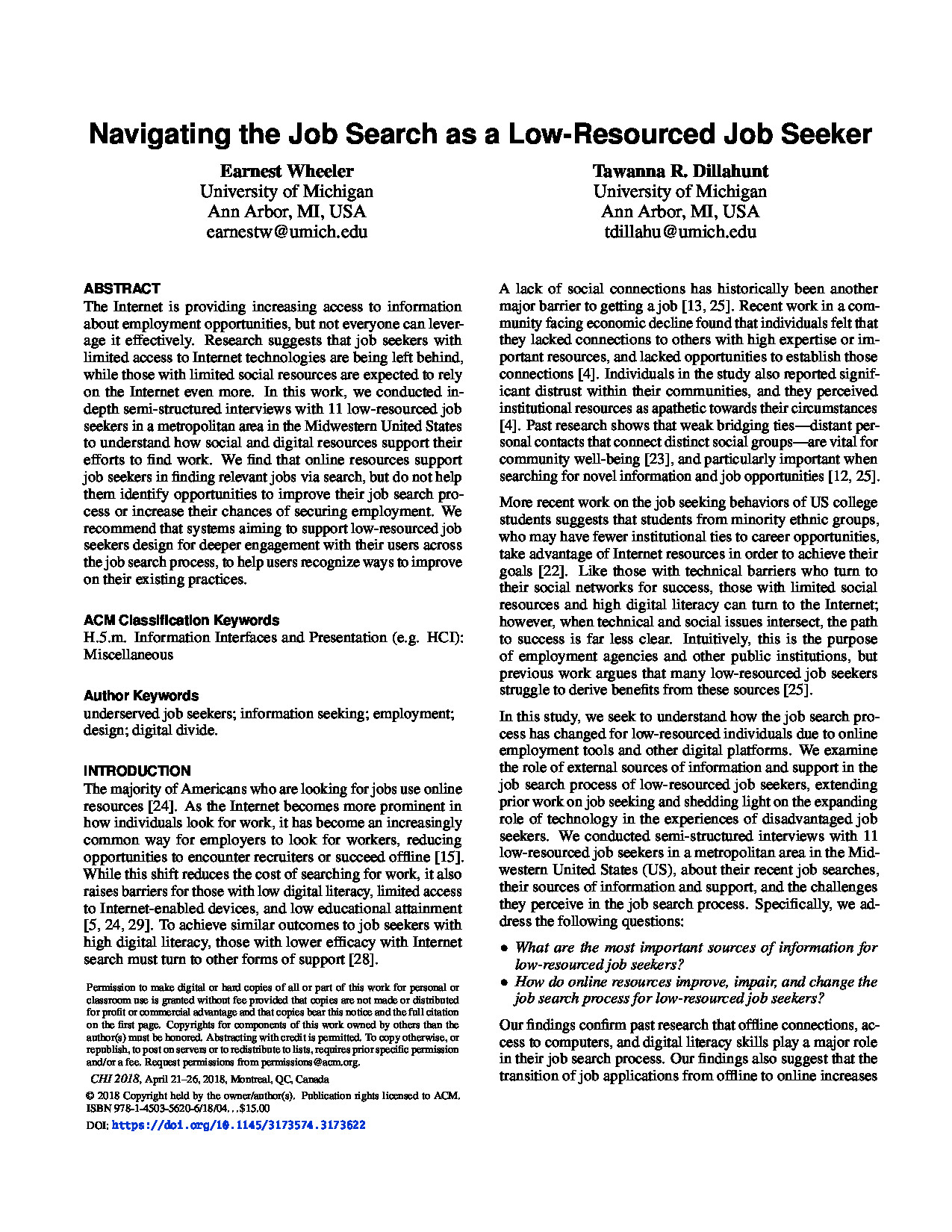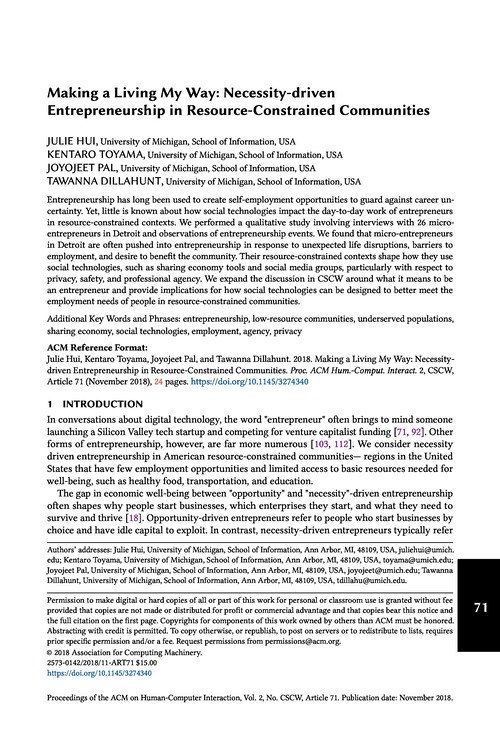
No Poverty
Inform efforts to collectively end poverty in all its forms everywhere
Related work
-
Designing Psychologically Safe Online Spaces: Supporting Aspiring Entrepreneurs in Financially-Constrained Communities.
Israni, A. and Dillahunt, T.R.
| in Proc. ACM DIS'25 | In fields like Human-Computer Interaction designing for safety often focuses on mitigating interpersonal harms such as online harassment. While essential, this emphasis may overlook the psychological aspects of safety, including trust. These aspects are especially important in marginalized contexts. This study explores the factors that foster psychological safety among financially-constrained aspiring entrepreneurs. Using a case-study approach, we analyzed data (10 interviews, 3 focus groups) from 21 financially-constrained aspiring entrepreneurs who engaged with a community-based sociotechnical platform. We identified four key factors that shaped participants’ sense of psychological safety: shared identity, interpersonal trust, perceived expertise, and shared accountability. These insights inform design strategies emphasizing shared accountability and leveraging collective identities to empower users in underserved communities. While centered on financially-constrained entrepreneurs, these strategies offer broader applications and should be considered when creating online spaces that promote connection, collaboration, and psychological safety across diverse contexts. -
A Comparative Analysis of Social Media Platforms: Cultivating Psychological Safety for Financially-Constrained Aspiring Entrepreneurs.
Yudiani, A.P., Dillahunt, T.R., Israni, A.
| In ACM CHI'25 Extended Abstract | Psychological safety, which allows people to seek feedback and ask questions without fear, is essential for aspiring entrepreneurs in financially-constrained communities to access support online. However, little is known about how existing social media platforms support psychological safety for individuals in these communities. To address this gap, we conducted a competitive analysis of seven social media platforms frequently used by entrepreneurs, evaluating each based on established criteria for fostering psychological safety. These criteria included features that guided interactions, highlighted shared identities among community members, protected user privacy, and fostered interpersonal trust. We identify untapped opportunities for social media platforms to better support financially-constrained aspiring entrepreneurs. These include incorporating effective conversational prompts, emphasizing more meaningful shared identities, and promoting synchronous interactions. Our findings offer actionable insights for designing psychologically safe and inclusive social media platforms to support financially-marginalized communities. -
Fostering Social Capital in Economically Distressed Communities
Dillahunt, T.R. (2014)
| In Proc. of the SIGCHI'14 Conference on Human Factors in Computing Systems | Past Information and Communication Technology (ICT) literature suggests that engaging in meaningful activities with ICTs may be related to socio-economic security, social inclusion, empowerment, and increased social capital. However, we identify a pervasive lack of understanding in existing literature, which raises an important research question: how can we build social capital where little social capital exists? We conducted a preliminary study to explore whether and if so, how, individuals in an economically distressed population with limited social capital use technologies to increase social capital and achieve socioeconomic security. We contribute details about barriers affecting social capital (e.g., difficulties finding and making the right connections and an overall lack of trust within communities). We also suggest ways in which ICTs can assist populations that could benefit most from increased social capital and economic security. -
Everyday Resilience: Supporting Resilient Strategies among Low-socioeconomic-status Communities
Vyas, D. and Dillahunt, T. (2017)
| In Proc. of the ACM'18 Conference on Human-Computer Interaction | The Internet is providing increasing access to information about employment opportunities, but not everyone can leverage it effectively. Research suggests that job seekers with limited access to Internet technologies are being left behind, while those with limited social resources are expected to rely on the Internet even more. In this work, we conducted indepth semi-structured interviews with 11 low-resourced job seekers in a metropolitan area in the Midwestern United States to understand how social and digital resources support their efforts to find work. We find that online resources support job seekers in finding relevant jobs via search, but do not help them identify opportunities to improve their job search process or increase their chances of securing employment. We recommend that systems aiming to support low-resourced job seekers design for deeper engagement with their users across the job search process, to help users recognize ways to improve on their existing practices. -
Navigating the Job Search as a Low-Resourced Job Seeker
Wheeler, E., and Dillahunt, T. R. (2018)
| In Proc. of the CHI'18 Conference on Human Factors in Computing Systems | The Internet is providing increasing access to information about employment opportunities, but not everyone can lever- age it effectively. Research suggests that job seekers with limited access to Internet technologies are being left behind, while those with limited social resources are expected to rely on the Internet even more. In this work, we conducted in- depth semi-structured interviews with 11 low-resourced job seekers in a metropolitan area in the Midwestern United States to understand how social and digital resources support their efforts to find work. We find that online resources support job seekers in finding relevant jobs via search, but do not help them identify opportunities to improve their job search pro- cess or increase their chances of securing employment. We recommend that systems aiming to support low-resourced job seekers design for deeper engagement with their users across the job search process, to help users recognize ways to improve on their existing practices. -
Making a Living My Way: Necessity-driven Entrepreneurship in Resource-Constrained Communities
Hui, J., Toyama, K., Pal, J., and Dillahunt, T. R. (2018)
| In Proc. of the ACM'18 Conference on Human-Computer Interaction, CSCW | Entrepreneurship has long been used to create self-employment opportunities to guard against career uncertainty. Yet, little is known about how social technologies impact the day-to-day work of entrepreneurs in resource-constrained contexts. We performed a qualitative study involving interviews with 26 microentrepreneurs in Detroit and observations of entrepreneurship events. We found that micro-entrepreneurs in Detroit are often pushed into entrepreneurship in response to unexpected life disruptions, barriers to employment, and desire to benefit the community. Their resource-constrained contexts shape how they use social technologies, such as sharing economy tools and social media groups, particularly with respect to privacy, safety, and professional agency. We expand the discussion in CSCW around what it means to be an entrepreneur and provide implications for how social technologies can be designed to better meet the employment needs of people in resource-constrained communities. -
`A Library of People’: Online Resource-Seeking in Low-Income Communities
Israni, A., Ellison, N. B., Dillahunt, T. R. (2021)
| in Proc. of the ACM'21 Conference on Human-Computer Interaction, CSCW 1 | Social media platforms provide access to informational and emotional resources that can enable low-income populations to further their socioeconomic mobility and cope with unexpected life demands. However, lack of both interpersonal trust and a sense of shared identity often prevent low-income individuals from eliciting resources from the diverse networks embedded in these platforms. Building on past research, we investigated factors that facilitated and deterred low-income members of the community-based non-profit organization Family Independence Initiative (FII) from seeking informational and emotional support from other members on the organization's social media platform, UpTogether. We found that despite participants' perceived shared identity, members primarily requested resources from other UpTogether members through offline interactions due to lack of interpersonal trust. We extend existing research on the limitations of shared identity and the role of interpersonal trust and social norms in facilitating resource-seeking interactions among strangers in low-income contexts. We suggest that social media platforms incorporate pseudonymous posting to facilitate relationship development and allow users to disclose their needs without revealing identifying information.
